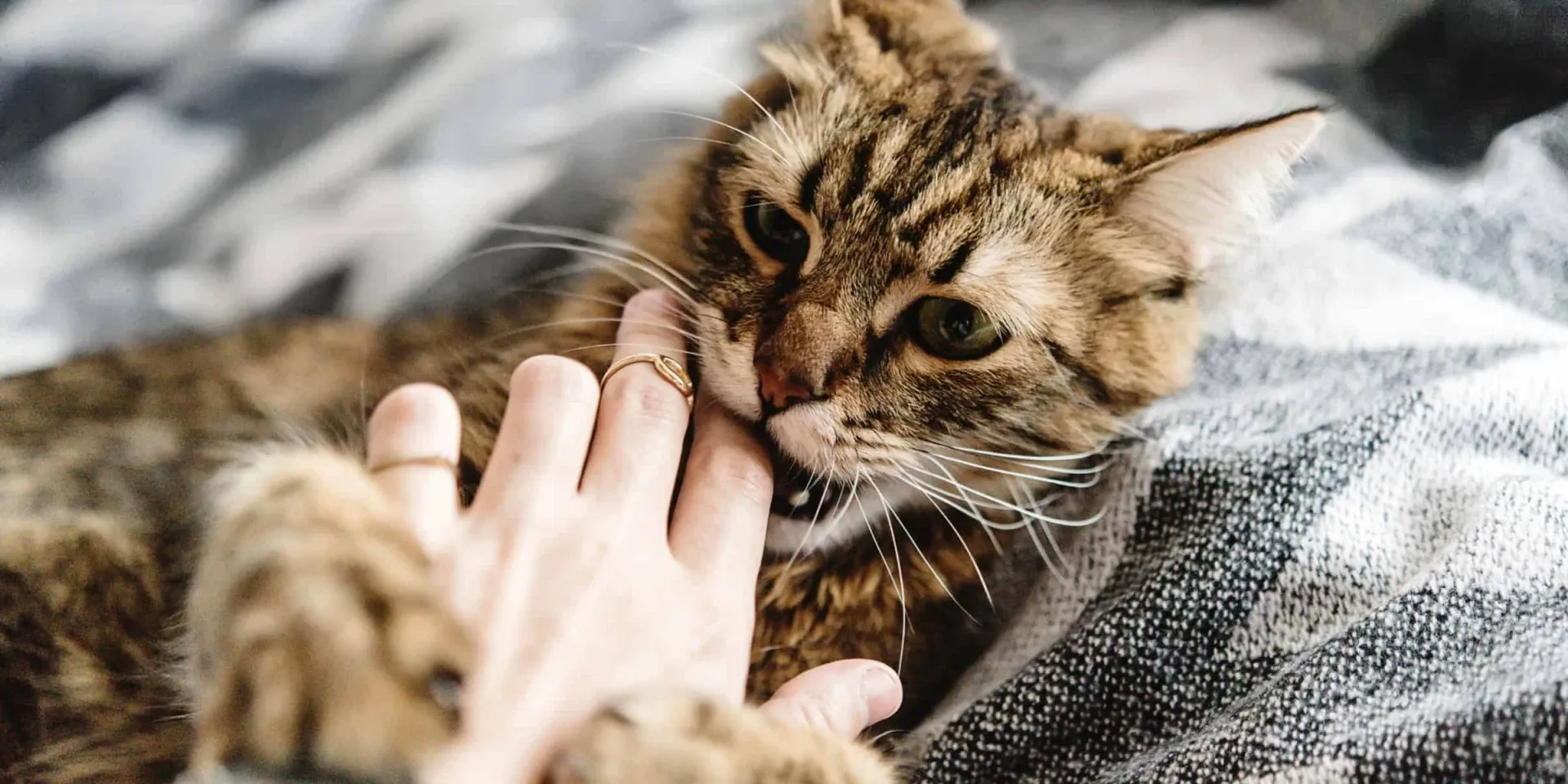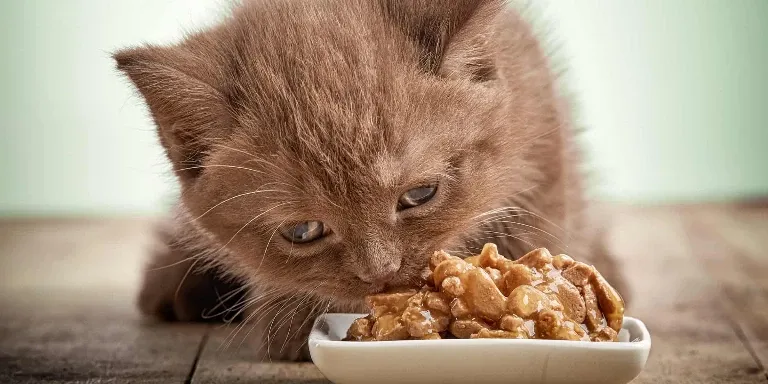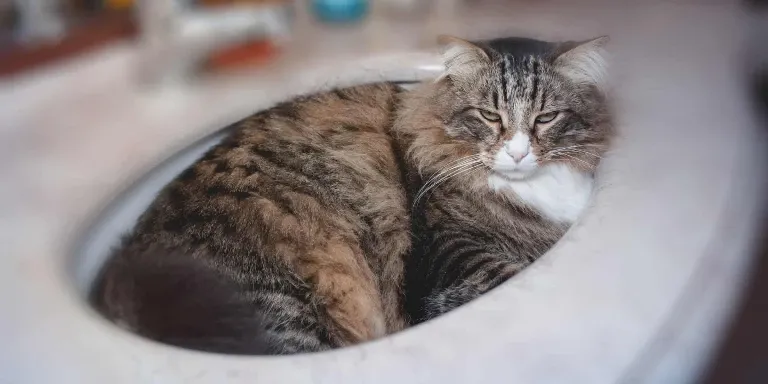The Best Fluffy Pancakes recipe you will fall in love with. Full of tips and tricks to help you make the best pancakes.

Have you ever been bitten by a playful kitten and shrugged it off as nothing more than a minor annoyance?
Kitten bites can be dangerous as they can transmit bacteria that can cause infections such as cat scratch fever. It is important to clean the bite thoroughly with soap and water and seek medical attention if the bite becomes red, swollen, or infected.
Kittens may seem innocent and cute, but their bites can lead to serious infections that require medical attention.
It’s important to understand the risks of kitten bites, especially if you frequently interact with these furry creatures. In this article, we’ll explore the common types of bacteria found in kitten mouths, the symptoms of infections, how to treat kitten bite infections, and tips for preventing kitten bites.
By the end of this article, you’ll have a better understanding of the potential dangers of kitten bites and how to protect yourself and your loved ones from infection.
Understanding the Risks of Kitten Bites
You might think that a playful kitten bite is harmless, but it can actually pose a risk of infection if their tiny teeth break your skin.
Kittens are known for their playful nature, and their small, sharp teeth can easily break the skin. This can lead to a wound that is at risk of becoming infected.
It’s important to recognize the early signs of infection and seek medical attention if necessary. Early signs of infection can include redness, swelling, and pain at the site of the bite.
If the wound begins to ooze pus or if you develop a fever, these are signs that the infection may be spreading. In some cases, a kitten bite can even lead to serious infections like cat scratch fever. If you notice any of these symptoms, it’s important to seek medical attention right away.
Preventing infection is key when it comes to kitten bites. Make sure to clean the wound with soap and water as soon as possible after the bite occurs. Apply an antiseptic cream or ointment to the wound to help prevent infection.
If the wound is deep or if it becomes infected, seek medical attention immediately. By recognizing the early signs of infection and seeking medical attention when necessary, you can help prevent serious complications from kitten bites.
Kitten bites can be dangerous if they break the skin and lead to infection. Recognizing the early signs of infection and seeking medical attention when necessary is key to preventing serious complications.
In the next section, we’ll take a look at some of the common types of bacteria found in kitten mouths.
Common Types of Bacteria Found in Kitten Mouths
It’s important to be aware of the different types of bacteria present in the mouths of kittens as they can potentially cause harm to humans. As kittens explore their surroundings with their mouths, they may bite or scratch humans, resulting in the transmission of these bacteria.
Common types of bacteria found in kitten mouths include Pasteurella multocida, Staphylococcus aureus, and Streptococcus species. One of the biggest concerns with bacteria transmission from kitten bites is the development of antibiotic resistance. Overuse of antibiotics can lead to the evolution of resistant strains of bacteria, making it more difficult to treat infections in the future.
Therefore, it’s crucial to take preventative measures to avoid being bitten by a kitten and to seek medical attention if you do experience a bite. Symptoms of infections resulting from kitten bites can range from mild to severe.
In the next section, we will go over these symptoms in more detail so that you can be prepared in case of an infection. Remember, prevention is key when it comes to avoiding the transmission of harmful bacteria.
Symptoms of Infections
If you experience a scratch or wound from a kitten, be on the lookout for symptoms of infection, such as redness, swelling, and warmth around the affected area. These symptoms may indicate that the kitten’s bite has transmitted harmful bacteria into your body, leading to an infection. Infections can be serious and can cause severe, long-term damage if left untreated.
To prevent transmission of harmful bacteria, it’s essential to take immediate action if you experience any symptoms of infection. First, clean the wound thoroughly with soap and water. Second, apply an antibiotic ointment to the affected area. Third, cover the wound with a sterile bandage to protect it from further contamination. Fourth, seek medical attention if the symptoms persist or worsen.
Identifying early signs of infection is crucial in treating kitten bite infections. Early signs may include fever, chills, fatigue, and muscle aches. If you experience any of these symptoms, seek medical attention immediately.
Remember, prevention’s always better than cure, so take the necessary precautions to avoid getting bitten by a kitten in the first place.
In the next section, we’ll discuss how to treat kitten bite infections.
How to Treat Kitten Bite Infections
Treating infections caused by kitten bites is crucial for preventing long-term damage to your health. But what are the best ways to go about it?
First and foremost, seeking medical attention is recommended for any bite that has broken the skin or caused swelling and redness. A healthcare professional can determine the severity of the infection and prescribe antibiotics if necessary.
If the infection is mild and you choose to treat it at home, there are a few steps you can take. Begin by washing the affected area thoroughly with soap and warm water. Apply an over-the-counter antibiotic ointment and cover the wound with a clean, dry bandage. Watch for signs of worsening infection such as fever, increased redness or swelling, and seek medical attention if these occur.
It’s important to note that not all infections caused by kitten bites will be treatable with home remedies alone. In severe cases, hospitalization and intravenous antibiotics may be necessary. If you experience any signs of infection, it’s important to seek medical attention promptly to prevent further complications.
Now that you know how to treat kitten bite infections, let’s discuss how to prevent them in the first place.
Preventing Kitten Bites
To prevent kitten bites, there are several key points to keep in mind. First, you should always use proper handling techniques when interacting with kittens. This means avoiding sudden movements and being gentle with them.
Additionally, it’s important to avoid rough play and provide appropriate toys to redirect their energy. By following these guidelines, you can help ensure a safe and enjoyable experience for both you and your kitten.
Proper Handling Techniques
When handling a kitten, it’s important to use proper restraint and socialization techniques to ensure their safety and comfort.
One of the key things to remember when handling a kitten is to support their entire body. This will help prevent them from feeling scared or threatened, which can lead to biting or scratching. Make sure to hold them securely, but gently, and avoid sudden movements or loud noises that could startle them.
In addition to proper handling techniques, it’s important to socialize kittens from a young age. This means exposing them to different people, animals, and environments to help them feel comfortable and confident in new situations. Proper socialization can also help prevent aggressive behavior, including biting and scratching.
By taking the time to properly handle and socialize your kitten, you can help ensure they grow up to be happy, healthy, and well-behaved cats.
Moving onto the next topic, it’s also important to avoid rough play to prevent kitten bites.
Avoiding Rough Play
Now that you know how to handle kittens properly, let’s talk about interactive play.
While it’s natural for kittens to play rough with their littermates, it’s crucial for you to teach them appropriate play behavior. This not only prevents them from hurting you or others, but it also helps them develop social skills.
One way to do this is to use training techniques like positive reinforcement. Encourage your kitten to play with appropriate toys and reward them with treats or praise when they do so. Avoid using your hands or feet as playthings as this can confuse and encourage rough play.
Remember, interactive play is essential for your kitten’s physical and mental development, but it must be done in a safe and controlled environment.
To continue promoting safe play, it’s important to provide appropriate toys for your kitten. These toys should be sturdy, non-toxic, and not easily swallowed.
In the next section, we’ll discuss some toys that are safe and entertaining for your kitten to play with.
Providing Appropriate Toys
You can keep your feline friend entertained and engaged by offering a variety of safe and stimulating toys that will keep them on their toes like a playful ball of yarn. Interactive play is an excellent way to bond with your kitten while also providing them with a healthy outlet for their energy.
Some great interactive toys for kittens include wand toys, puzzle feeders, and laser pointers. However, it’s important to supervise your kitten during playtime, as some toys can pose a choking hazard if they break apart.
In addition to providing appropriate toys, kitten proofing your home can also help prevent dangerous situations. Ensure that all cords and strings are securely tucked away, as kittens may chew on them and risk injury or ingestion. Keep small objects out of reach, as well as any toxic chemicals or plants.
By taking these precautions and providing safe toys, you can help keep your kitten entertained and safe.
Next, let’s discuss what to do if you or a loved one is bitten.
What to Do If You or a Loved One is Bitten
If someone is bitten by a kitten, it’s important to seek medical attention as soon as possible to prevent potential health risks. While kitten bites may seem harmless, they can still introduce harmful bacteria into the body.
First aid should be applied immediately to clean the wound and to stop any bleeding. Seek medical attention if the wound is deep or if there are signs of infection such as redness, swelling, or pus.
If the kitten is known to be infected with rabies or other serious illnesses, it’s important to seek medical attention immediately. Rabies is a viral disease that can be fatal if left untreated. Symptoms can take weeks or months to appear, so it’s important to seek medical attention as soon as possible if you suspect you may have been exposed.
Other serious illnesses that can be transmitted through kitten bites include cat scratch fever and toxoplasmosis.
Understanding the risks for certain populations is important when it comes to kitten bites. Individuals with weakened immune systems, pregnant women, and young children are at a higher risk for developing serious infections from kitten bites. It’s important to take extra precautions when handling kittens around these populations.
If you or a loved one falls into one of these categories, it’s important to seek medical attention immediately if bitten by a kitten.
Understanding the Risks for Certain Populations
Individuals with weakened immune systems, pregnant women, and young children are more susceptible to developing serious infections from being bitten by a kitten. When a kitten bites, it can transfer bacteria from its mouth into the wound. For vulnerable populations, this can result in serious infections that can even be life-threatening.
Identifying vulnerable populations and taking prevention strategies is crucial in protecting against the risks of kitten bites. For those with weakened immune systems, it’s important to avoid contact with kittens altogether. Pregnant women should wear gloves and wash their hands thoroughly after handling a kitten. Young children should be supervised when interacting with kittens to ensure they don’t get bitten.
In addition to prevention strategies, it’s important to be aware of the signs of infection. Symptoms such as redness, swelling, and fever are all indications that medical attention may be needed. By taking the necessary precautions and being aware of the risks, you can safely interact with kittens and avoid any potential harm.
Moving forward, here are some tips for safe interaction with kittens.
Tips for Safe Interaction with Kittens
To interact safely with young cats, it’s important to handle them gently and avoid rough play. Kittens are playful and curious by nature, but they may not understand their own strength when playing with humans. Always use a soft touch when handling kittens and avoid any sudden movements that may startle them.
Kitten socialization is an important part of their development. It’s important to expose them to different people, environments, and experiences so they can learn to adapt to new situations. This can help them become more confident and well-adjusted adult cats. However, it’s important to set boundaries and teach them what is and isn’t acceptable behavior. This can include teaching them not to scratch or bite during playtime.
When interacting with kittens, it’s important to be patient and understanding. Remember, they are still learning and may not understand what you expect from them. If they do bite or scratch, gently redirect their attention to a toy or another activity.
With patience and consistency, you can teach your kitten to interact with you in a safe and enjoyable way. By setting boundaries and providing positive reinforcement, you can help your kitten become a well-behaved and happy member of your family.
Is it possible for a kitten with rabies to bite and transmit the virus to humans?
Yes, a kitten with rabies can bite and transmit the virus to humans. It is crucial to be aware of kitten rabies symptoms, such as aggression, excessive salivation, and disorientation. Seek medical attention immediately if you suspect you have been bitten by a rabid kitten to receive proper treatment.
Conclusion
Congratulations on reaching the end of this informative article! By now, you should have a better understanding of the potential risks associated with kitten bites and how to prevent and treat infections.
Remember that while kittens may be cute and playful, their bites can be dangerous and even deadly if left untreated. It’s important to take the necessary precautions when interacting with kittens, especially if you or someone you know is at a higher risk for infection.
By following the tips outlined in this article, you can minimize the risk of kitten bites and ensure a safe and enjoyable experience for both you and your furry friend. Always remember to seek medical attention if you suspect an infection, and don’t hesitate to reach out to a healthcare professional for advice.
Stay safe and happy kitten cuddling!








